| POP MUSIQUE

These wonderful photographs
are from a French magazine in the early 70's entitled Pop Musique. These
and the article written in French ( of course ) come courtesy of Jennifer Perez.
As I can not read French, a big thank you is in order to Michael Valenzuela for
translating this article for Majicat readers. If I were to take a guess, I would bet some
of these photographs were taken at the time of the Tea For The Tillerman picture shoot.
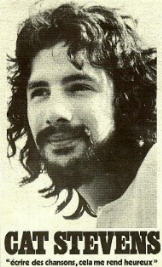
Cat Stevens "Writing
songs, that makes me happy."
It was scarcely 3 years
ago that Cat Stevens had a nervous depression. He was 19 years old
At least, that is what some
people say. Others say that Stevens suffered from tuberculosis and others pretend that the
3 month period that he spent in the hospital was just for rest. In all cases, the truth is
that Steve, better known by the public under the name Cat Stevens, suffered a strong dose
of popularity. The boy who composed and recorded songs like "I Love My Dog",
"Matthew and Son", and "Here Comes My Baby", was incapable of facing
the responsibility of being a star and did not support in some sort the demands of the
job.
The rest did him good. He
took the time to read, discovered the art of painting and wrote numerous new songs that he
had never recorded before. (The songs from his first album after his "comeback",
"Mona Bone Jakon", were written during a period of three months specially
dedicated to his album.) It was clear that he was ready to do another foray in the world
of Pop.
This son of a Greek father
and a Swedish mother (Steve insists a lot the big influence of Greek music on his own
compositions) received his name from one of his girlfriends when he was 17 years old. She
was in the habit of calling him "Cat" (a popular American expression to call a
boy, literally "cat". In the same way, one would call a girl "chick".)
that became "Cat Steven", to which he added an "s", so , "Cat
Stevens".
As we spoke, I felt all
during his comments an uncertainty, often approaching paranoia, about the role that he has
to play. After all, wasn't this interview the type of professional obligation that he
wanted to escape from? But he "applique" to answer all our questions, hesitating
for a while sometimes, uncomfortable with the truth that he gave us at last. Simplicity
seemed to be his defense. Wanting to be sincere with himself, he had to be sincere with
us.
His voice was always calm
and soft, sometimes scarcely a murmur. When he talked about Donovan, it was clear that he
was talking about himself. When we tackled the problem of the obligations of success, his
answer, "Yes, but it is exactly what I don't want", was given in a murmur, like
a question.
Cat Stevens, born Steven
Dimitri Georgiou, is a very sensitive boy, and his music follows directly from that
sensitivity. His process of creation imposes him to totally free himself from his being,
and his music is at the same time delicate and deep because of that. Cat talks about
himself.
This interview took place
in Los Angeles. Cat had just finished one triumphant week at the Troubador, the most
famous pop club of Los Angeles, and he was preparing to return for two more weeks, under
the pressure of popular demand.
Pop Music - First allow us
to ask some stupid questions. Can you explain the meanings of the titles of your two last
albums, "Mona Bone Jakon" and "Tea for the Tillerman".
Cat Stevens - "Mona
Bone Jakon" is another name for my "penis". It's the name I give it. It's
not some sort of secret vocabulary, it's just something I made up. "Tea for the
Tillerman" ... "tillerman" is guy who tills the land, a sort of peasant.
This has a direct connection with the drawing on the cover. I loved that drawing so much,
it brings back many elements of the song, that I thought that the title was perfect to go
along with the album.
PM - Did you write the song
after you made the drawing?
CS - No, I just had some
little bits of song, and then I made the drawing. That went very well. That agreed very
well with the LP. I love to paint. I'd like to return to painting anew, but I don't have
the time. It cost me a lot by not painting. That frees my mind. Completely.
PM - How has the public
reacted to your new music?
CS - When you make a style
of music so soft, it influences the behavior of the public. They are very attentive and
they listen a lot. The attention is truly strong over here, when you really have a good
public. They really follow you on your "voyage", and it's wonderful. In England,
you often get the impression that they hold themselves back, that they don't follow you.
The only way for me to work is when everything is relaxed. Completely relaxed. And if the
people really want to discover me, then it must be this way. It's the only way. That's the
way they do it in England. They put out the record with a minimum of publicity, and little
by little the people hear it and buy it by word of mouth, and because they really want it.
PM - Do you prefer to
perform in a club with just a guitar, or with a small group as you do on your records?
CS - I don't know, on the
LPs, the sound is simply amplified...
PM - Many critics have
compared your music and concerts to those of Donovan. How do you react to those kinds of
comparisons?
CS - Well, it's the same to
me, because I don't think that my music resembles Donovan's in all aspects. I think that
when one has departed from the same source, and one sees that of America, it seems that
one is going in the same way. But when you come from England, you understand that there
are tons of musicians issued from the same inspiration. That comparison doesn't do
anything for me, insofar as one compares me to Donovan, or one is in the habit of making
that comparison. It is only... Well, I don't like to criticize, but I don't think he's
going anywhere at this moment. I heard the last things he did and to me they only
seemed... empty. I know what he was trying to do with "Barabajanle". He just
wanted to make a rock record; because he felt frustrated, he had made so many things in
the "mellow" style, he wanted to break from that. But also, it was necessary to
account to his producer, I think, because Mickey Most is the type who only thinks about
the commercial side, I mean that everything that he puts out is a "hit". And you
ask yourselves, "Well then, who is the star of the moment, inside?" because
apparently, he does what he wants in the studio.
PM - Were you a producer
yourself?
CS - A little, yes. I don't
like producing a lot because I'd rather my role be as a singer. And, I can't produce what
I make. I tried, but I was too close to things and I could not see them. That's why Paul
Samwell-Smith is a good producer. He sees everything clearly. That also frees the mind.
PM -Who were your favorite
musicians up to then?
CS - Buddy Holly,
Leadbelly, Dylan, Nina Simone. There is my musical taste. At this moment, well, I always
liked Steve Miller. After I got to America, I heard this record by Leo Kottke. It's good,
really very good. It's really lively, personal. He just went into the studio and made it
all by himself.
PM - Will you continue to
sing as you have done up to now, or will you do something different?
CS - I don't know. I have
just a little idea for the next LP. I'd like to try other types of orchestration, not just
my voice alone. To reunite only a lot of people and make a pile of music. I don't know
how. I've just one idea on the subject. It won't be an opera or a big work of that kind,
but it will be... what I want to do.
PM - Will you return to
your old style?
CS - No... no, I don't
think so. I made "Here Comes My Baby". I don't know. Maybe in a few years I'll
return to that. But for the moment, all that is too near and I am trying to do something
different... No, I don't think so. There are three songs that I still sing. I sing
"Matthew and Son" sometimes too.
PM - I get the impression
that your music can evolve across vast domains. I think about the song "Father and
Son". Do you think of doing music for films or something of that genre?
CS - That song was for a
musical. I think about it a lot. I don't know. Scene music, when it monopolizes you,
imposes too many obligations. People just want you to stay there, they put a label on you.
It's what I can't support. I really want to stay free, I want to say. If I wanted to, I
want to be able to abandon music and to spend a year painting. I mean that I don't want to
be limited because of business or... you are a prisoner of all that "social
environment" of the pop business.
PM - Where do you feel the
pressures come from? How can you continue to do what you want to do?
CS - I think that comes
just from... all the business. You go to a club and you want to play, sure that you want
to play, but you don't want to play three, four times in the same night sometimes. And
that's what doesn't work.
PM - Do you have particular
problems with a large audience?
CS - No, that all happens
far away, it's true. No, I think the important problem is to cross the footlights. In
reality, when I'm on stage, I arrive finally to sing for myself alone. I can't think, even
imagine, that there are 14,000 people. I only think about my song, and what I want to
express within. Well, if I do that, then I "touch" these 14,000.
PM - Do you think that your
songs are very personal?
CS - Yes, it's true. I'm
astonished that people like them... because they are so personal. But it's not an
obstacle, of one kind or another, they have a symbolism which permits people to recognize
themselves therein.
PM - Is "Father and
Son" more personal or theatrical?
CS - I think everything
that I write should be personal, otherwise I wouldn't do it, the songs that I write, and
the ones that weren't personal never worked. "Father and Son" is as much about
my relations with my father as my relations with society. It's always been that way. It's
the same thing as when I talk about business. That's what I want to explain, in the song,
I talk about a father and a son because in fact it all starts from there.
PM - One has said that your
words in general lack maturity?
CS - I can only write what
I write. I certainly don't think that it lacks maturity. I've been writing for a long
time, and I passed through many stages. I should say that it's not easy to do. But I've
got to write it that way, and I remain faithful.
PM - Do they (the songs)
satisfy you?
CS - Yes, because they
are... they are me.
PM - Do you have a goal?
For yourself or your music?
CS - My goal?
PM - That's a bad question.
CS - No, no, I see well
what you want to say. I think that earlier I had a goal. Now, my goal, I don't know. I'm
the type of person who can sit at a distance and watch a race and study it, it's that way
that I find peace. I don't find so much peace by winning the race. The pleasure of the
race is for me. It's like that.
PM - Are you in a race?
CS - There's the question !
Am I or am I not? I don't know. I don't think so. I think that I am on the outside,
because I've always been like that.
PM - The question is, after
all that, what will happen when you reach the point that Donovan has reached, and became
like a little god? Then he wanted to be someone else.
CS - Yes, but that's not
what I want... I think that I am capable of controlling that meanwhile, because I have...
I've... I've done it before, and I lost, but especially because I wanted it. I went in a
strange way and it didn't matter how, I was placed in such a strange situation that I was
obliged to dislocate. In a certain way, it was maybe what I wanted, to be at the deepest
bottom, then to escape myself. I don't think that now I still have to dislocate or escape.
All I have to do is to continue to realize why I was made, and that's principally to... to
make myself happy. That's exactly what the act of writing songs gives me: that makes me
happy.
In the margin of the
interview - the last impressions of Cat Stevens in public.
I haven't heard Cat Stevens
since last November, already five months ago. Apart from the personnel changes mentioned
above, I didn't notice any profound changes in his songs. Maybe they are a little more
introspective, "How Can I Tell You", and less positive in emotion,
"Tuesday's Dead", than his compositions of the past years. But definitely, it's
the same inspiration. The only good surprise during the evening was his piano playing in
"Nothing But Regret" and "Miles From Nowhere". His style was gentle,
and without pretension, and went perfectly with the song.
After accompanying himself
on piano, Cat returned to guitar and finished the evening standing up. He played
"Longer Boats", "Peace Train", "Hard Headed Woman" and
"Father and Son", a true professional, always standing and following the music
with his body. But the global effect wasn't good. Cat wrote very personal songs, and he
had the habit of creating such an intimate ambiance. That evening, it seemed almost like a
bastardization of the true artist.
I don't want to put Cat
Stevens off; his recital, like his songs, were perfect. I just resented a certain loss of
contact with the audience, a distant behavior, if you prefer. The talent was there, but
the sincerity, in a way, was absent.
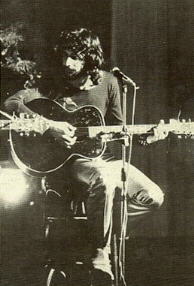 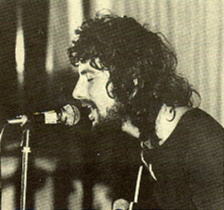 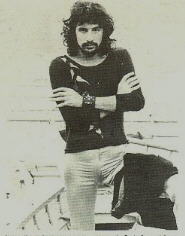
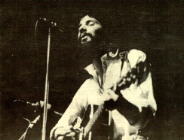 |